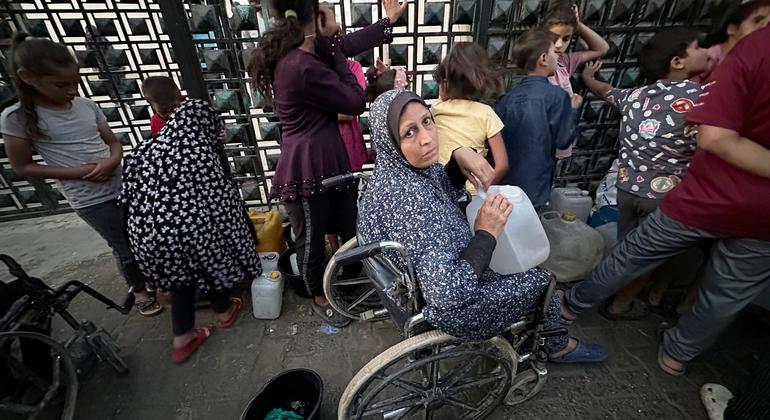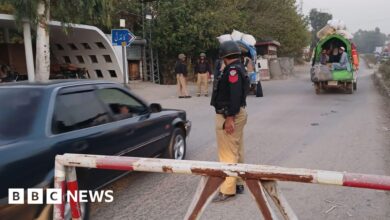Gaza: Rafah camp attack increases focus on dwindling medical resources

Many of the injured suffered severe burns, according to the World Health Organization (WHO), requiring intensive treatment, electricity, and high-quality medical services, all of which are scarce after nearly eight months of war.
Great medical challenge
WHO spokeswoman Margaret Harris told journalists in Geneva that this was just another major challenge for all health teams in the region.
“This is one of the hardest things for a doctor or nurse to do when you want to help, but you don’t have what it takes,” Dr. Harris said.
“You are watching people who should not die, die right in front of you simply because you lack the tools, skills or supplies to do what needs to be done.”
Israel’s assault on Rafah has displaced medical workers while vital fuel stocks continue to dwindle as UN humanitarian operations are nearly shut down in the latest escalation began three weeks ago, sparked by a deadly Hamas rocket attack on the Kerem Shalom border crossing.
Fuel is scarce
WHO confirmed that three of its supply trucks have crossed the Kerem Shalom border since the incursion began, but 60 are stuck in Egypt due to the border closure.
Despite needing around 200,000 liters of fuel a day, Dr Harris said the WHO can only access a maximum of around 70,000 liters a day – but some days, there is none at all.
“All the hospitals are really struggling and are making decisions about what they can do,” she added.
According to the United Nations Children’s Fund, fuel is vital for hospital generators, but it is also needed for bakeries and domestic desalination plants, which receive only 10% of their supply. that they needed this past week.UNICEF).
In condemning the attack, WHO Director-General Tedros Adhanom Ghebreyesus noted that only a third of Gaza’s hospitals “remain partially operational”.
Tough conditions, tough decisions
Harsh conditions meant medical staff were unable to perform the surgery needed to save a limb.
“Doctors have to make the decision to amputate a limb to save a life and again, that’s a terrible, terrible decision to have to make,” Dr. Harris said.
UNICEF spokesman James Elder noted that many children with one or two limbs amputated were sitting in tents in Rafah under extreme stress.
“What do we say about the countless children with missing arms and legs? Or thousands of orphans? And what language is used to describe the unprecedented destruction of homes and schools, to the unexplored scope of children’s trauma? he warned.
“I think certainly the question that needs to be asked is, ‘How many more mistakes will the world have to endure?'”

Internally displaced persons (IDPs) fled Rafah following the evacuation order, arriving in the Al Mawasi area west of Khan Younis.
Threat of further displacement
About a million people have fled Rafah, in southern Gaza, since the start of Israel’s military campaign there on May 6 and continues to increase in intensity.
Humanitarian agencies now fear more people will be displaced following Sunday’s deadly raid, which was widely condemned, while Israeli tank attacks were reported in central Rafah .
Commissioner General of the United Nations Palestine Refugee Agency, UNRWAPhilippe Lazzarini said Tuesday that heavy bombardment continued overnight in Rafah, including in Tal Al Sultan, where the main United Nations offices in Gaza are located.
“Most of our employees cannot work. They are packing up and moving. They are extremely scared,” he said in a post on social media platform X, formerly Twitter.
Diseases are increasing
Meanwhile, aid flows into Gaza fell so sharply in May that humanitarian officials warned the threat of widespread famine was more acute than ever.
In addition, the constant lack of clean water and sanitation also causes very high rates of acute respiratory infections, diarrhea, including bloody diarrhea, as well as hepatitis A, said Dr. UNRWA Health Director, speaking in Geneva.
“What we need now is a ceasefire. We continue to do whatever we can, but there is no ceasefire, no peace on the ground, no peace in mind, we continue to suffer and I’m sorry to say that the people of Gaza can continue to suffer.”
Annual health report
UNRWA also announced annual report on providing medical services to Palestinian refugees in five locations in the Middle East: Jordan, Lebanon, Syria, the Gaza Strip and the West Bank, including East Jerusalem.
Despite challenges to its operations, the agency delivered nearly seven million primary care consultations across the region in 2023.
About two million Palestinian refugees have used its services, including 300,000 people with diabetes and high blood pressure, and about 70,000 pregnant women.
UNRWA maintains high levels of vaccination, including in Gaza, which has played a key role in preventing outbreaks of vaccine-preventable diseases.
Health emergency in Gaza
The report said Palestinians are facing an unprecedented health emergency caused by the most brutal war in their history.
The conflict has severely impacted the health and well-being of the population, with increasing levels of injury, trauma and mental health disorders.
The destruction of infrastructure and transportation has made the provision of health care more complicated, while overcrowded living conditions and limited access to clean water have increased the risk suffer from infectious diseases.
Malnutrition has also worsened, with a third of children under 2 years old in northern Gaza suffering from acute malnutrition.
Access to healthcare fell in the final quarter of 2023, as 14 out of 22 health centers shut down and power outages paralyzed telehealth .
In response, UNRWA opened 155 emergency shelters and deployed 108 mobile medical units, coordinating the transport of essential medicines and conducting disease surveillance.
UNRWA remains on the frontline amid the war and the agency has lost more than 191 staff, including 11 healthcare professionals.




